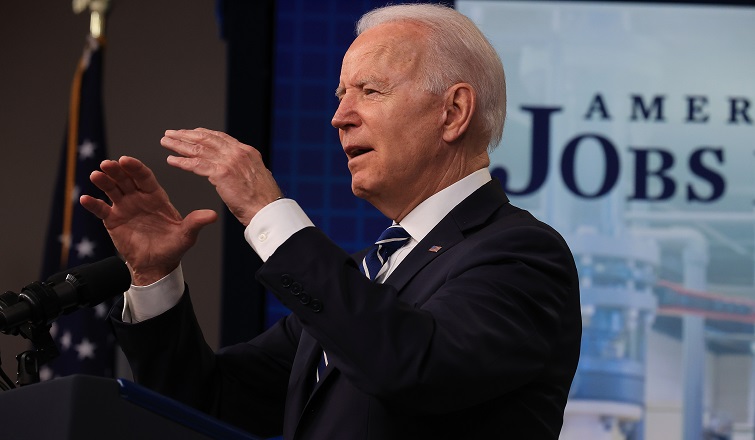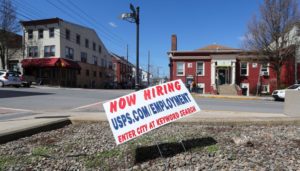Is it morning in President Joe Biden’s America? If so, it might not be as sunny as the administration would hope. Indeed, it was a cloudy week on the economic data front, even with the world’s largest economy reopening in the aftermath of the coronavirus pandemic – for now. What are the numbers showing as the nation attempts to move on from the highly infectious respiratory illness?
A Cloudy Morning in Biden’s America
According to the Bureau of Economic Analysis (BEA), the U.S. economy expanded 6.5% in the second quarter, falling short of the median estimate of 8.5%. Growth was driven by non-residential fixed investment, exports, and state and local government expenditures. This was offset by a contraction in residential fixed investment, federal government spending (gasp!), and imports.
The latest GDP figures have economists concerned that the Delta variant, labor shortage, a cooling housing market, and surging inflation could further weigh on the national economy in the second half of 2021. But the gross domestic product was not the only factor to trigger consternation among the country’s top financial minds.
Initial jobless claims hit 400,000 for the second consecutive week in the period ending July 24, coming in higher than the market forecast of 380,000. Continuing jobless claims climbed to 3.269 million, while the four-week average, which eliminates week-to-week volatility, topped 394,000. All eyes will undoubtedly be on the July jobs report, with analysts penciling in a gain of 900,000 new positions.
Moreover, the personal consumption expenditures (PCE) price index, which is the Federal Reserve’s preferred inflation measurement, advanced to a 30-year high of 6.4% in the second quarter, up from 3.8% in the previous quarter. On a month-over-month basis, the PCE index swelled 0.5% in June, but there was some minor good news: personal income edged up 0.1%, and personal spending jumped 1%. Unfortunately, this was offset by the University of Michigan’s consumer sentiment and current conditions declining and inflation expectations increasing to 4.7%.
Overall, the post-coronavirus boom might be slowing down. It is not a specific thing that is contributing to the bump in the road, but rather a myriad of factors, from surging prices to a resurgence in COVID-19 cases. As long as the Federal Reserve holds the economy’s hand, everything will be OK, right? Right?
Cue the Taper Talk
The Federal Reserve is stuck between a rock and a hard place. If it continues to execute $120-billion-a-month bond purchases, the central bank risks ballooning inflation. On the other hand, if it takes its foot off the gas, the Eccles Building threatens the recovery in both the economy and the financial markets. But one key Fed official believes now is the time to start tapering the pandemic-related quantitative easing (QE) program. Will his colleagues listen? The next policy meeting should be intriguing.
Talking with reporters following a virtual speech, St. Louis Federal Reserve President James Bullard proposed tapering the institution’s massive monthly purchases this fall and ending the program at the end of March. He also suggested this would help lay the groundwork for a possible boost in interest rates later this year. If inflation is running hotter for longer, he noted, it might be time to tighten policy. Otherwise, the Fed will be behind the curve.
“We are tilted too much to the dovish side. The whole central bank community has been in dovish mode for a long time. If the data shift against us we may have to move quickly, and that can be disruptive.
My preference would be to get to a decision in September and start sometime after that. My main goal would be to get done by the end of the first quarter. We should go ahead and get the taper going, get it behind us, so we would have some optionality to handle the possibility — maybe not even the likelihood — the possibility that inflation is more persistent and higher than we’d like.”
The Fed completed its two-day Federal Open Market Committee (FOMC) policy meeting on Wednesday, leaving benchmark interest rates unchanged at 0.25%. Fed Chair Jerome Powell stated the job market recovery was still “a ways off,” which would encourage the central bank to taper. Powell also made quite the revelation after repeating for months that inflation would be minimal and transitory. “Inflation could turn out to be higher and more persistent than we expect,” he conceded.

It’s Repo Madness, Baby!
Months before the COVID-19 public health crisis, one of the biggest stories in the financial sector was the volatile repo market. This is a part of the industry that allows lucrative investment funds and banks to borrow money at low rates, while letting entities with immense cash flows, such as money market mutual funds, generate a little return on that cash without too much risk. Put simply, a repurchase agreement is a transaction involving one party selling an asset to another party with the pledge to repurchase the asset at a later date.
For the first time ever, dozens of participants stored more than $1.01 trillion at the overnight reverse purchase facility, beating the previous all-time high of $991.93 billion at the end of June. The demand has been climbing since the Fed raised the short-term offering rate from 0% to 0.05%, triggering a wave of fresh liquidity.
As this segment of the market blows up, the Fed is beginning to take action by launching a permanent standing repo facility, one for domestic banks and another for foreign organizations. Minutes from the April FOMC meeting highlighted broader support among members as they “saw the potential benefits of an appropriately calibrated facility as outweighing the potential costs.”
~
Read more from Andrew Moran.





